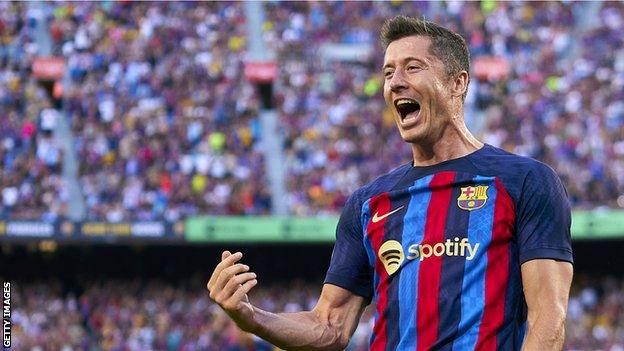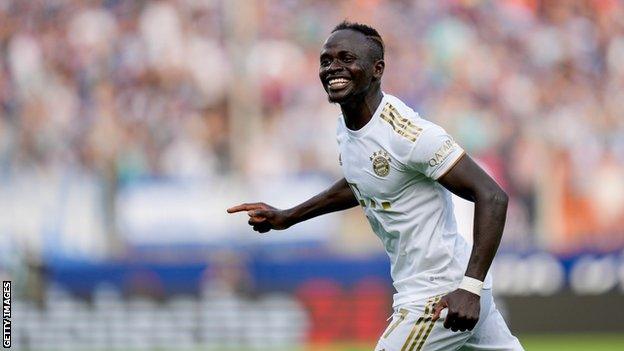Bayern Munich: Can Bundesliga club be better without Robert Lewandowski?
- Published
- comments

Lewandowski scored 344 times in 374 games for Bayern and is their second-highest scorer ever behind Gerd Muller
Bayern Munich are known for conducting transfer business as quietly as possible - this summer was different.
Robert Lewandowski, who had played eight years for the club, engaged in a public battle with Bayern's management and directors, trying to force his way out.
After weeks of denying any intentions to sell the Poland striker, the German giants gave the green light for Lewandowski's move to Barcelona.
Their reluctance seemed justified, given that Lewandowski had been a life insurance for Bayern for quite some time. The expectation was that the loss of such a prolific goalscorer would diminish the Bundesliga champions' attacking power significantly - until Bayern played their first competitive match of the new season.
They met RB Leipzig in the domestic Super Cup game in July. Leipzig, who on paper have one of the strongest squads in the Bundesliga, were obliterated in their own stadium in the first half. Bayern led the game 3-0 and showcased a new style.
Without Lewandowski, their attack looked more unpredictable than ever as manager Julian Nagelsmann returned to the fast-paced football he made his name for at TSG Hoffenheim.
He chose a 4-2-2-2 formation, giving up on the idea of focusing on one target striker. The narrow formation allows them to play vertical passes between four pairs: the centre halves, the centre midfielders, the attacking midfielders and the strikers.
Bayern start their Champions League campaign at Inter Milan on Wednesday sitting just third in the Bundesliga but can they still mix it with the elite in the absence of Lewandowski?
Mane and Musiala thrive

Sadio Mane made a £35m move from Liverpool to Bayern Munich in June
While Nagelsmann should be applauded for coming up with a plan that would negate the necessity of a Lewandowski-like target man, he would not have much success without the technical precision and mental quickness of his key players.
In light of the inevitable Lewandowski departure, Bayern's sporting director Hasan Salihamidzic entered the transfer market to acquire two new key figures in Sadio Mane and Mathijs de Ligt.
In addition, the two Ajax graduates Ryan Gravenberch and Noussair Mazraoui were signed in the early days of the summer, while 17-year-old forward prospect Mathys Tel moved from Stade Rennes to Munich late in the transfer window.
Salihamdzic was also able to clean up the squad, selling players such as Marc Roca and Omar Richards who had no future at Bayern.
What remains is a group of 23 players that look stronger than when Lewandowski was still around. Mane was expected to take the Pole's place in the line-up, and to an extent he has. But Mane is not a traditional target man, even if he is able to play the central role in a forward line.
Nagelsmann counts on the Senegal forward's positional understanding and his ability to drift between the lines, as he is employed in his two-man attack. The former Liverpool player has scored five goals in seven games so far this season. He needed no time to acclimatise in Munich.
His arrival was certainly made easier by those around him also stepping up their game. Most notably, Jamal Musiala has very quickly become a crucial piece of this Bayern side.
The 19-year-old German international is perfectly made for Nagelsmann's system because he thrives in tight areas and is able to defend the ball even against two or three markers.
It goes without saying that Thomas Muller, Leroy Sane, Kingsley Coman and Joshua Kimmich also thrive in direct and face-paced football. They have proven that already, particularly under head coach Hansi Flick when Bayern won the Champions League in 2020.
Union Berlin neutralised Bayern
Expectations rose after Bayern started the season scoring 20 goals in their first four games, including six against Europa League winners Eintracht Frankfurt. Many in Germany felt that no other side could realistically challenge them and deny them their 11th domestic championship in a row. But they have hit a few roadblocks recently.
First, they only drew with Borussia Monchengladbach at home, though the main reason for that outcome was an superb performance by Borussia goalkeeper Yann Sommer who made 19 saves, marking a new league record.
While that draw looked like a freak accident, Bayern also only drew 1-1 against Union Berlin last Saturday.
Union, arguably the most capable defensive side in the Bundesliga, laid out a blueprint for how to neutralise Bayern. They employed a narrow high press, closing down the passing lanes for vertical balls and putting pressure on Bayern's centre halves.
Union intended to eliminate any unpredictability by forcing Bayern to the wings where Coman or Sane would engage in one-on-ones which could be defended more easily than any quick pass combination. Mane was isolated up front and did not drop back into midfield to interact with his teammates as often as in previous games.
Nagelsmann has been confident that his team are able to break through tight defences. "To lay bricks against us is normal," he said. "But we will tear holes against deep-sitting opponents, too."
Union, however, presented a new problem in that they pressed higher up the pitch than others.
It is safe to say that Bayern's domestic rivals and their three opponents in Champions League group C have taken note and may even try to copy Union's defensive approach. Now it is up to Nagelsmann and his players to use this experience and refine their style even further.

How is the iconic red double-decker bus made? Gregg Wallace goes Inside the Factory to find out
'You cannot just walk away, they'll kill you': Police investigate an extremely violent gang in Devon's drug economy
